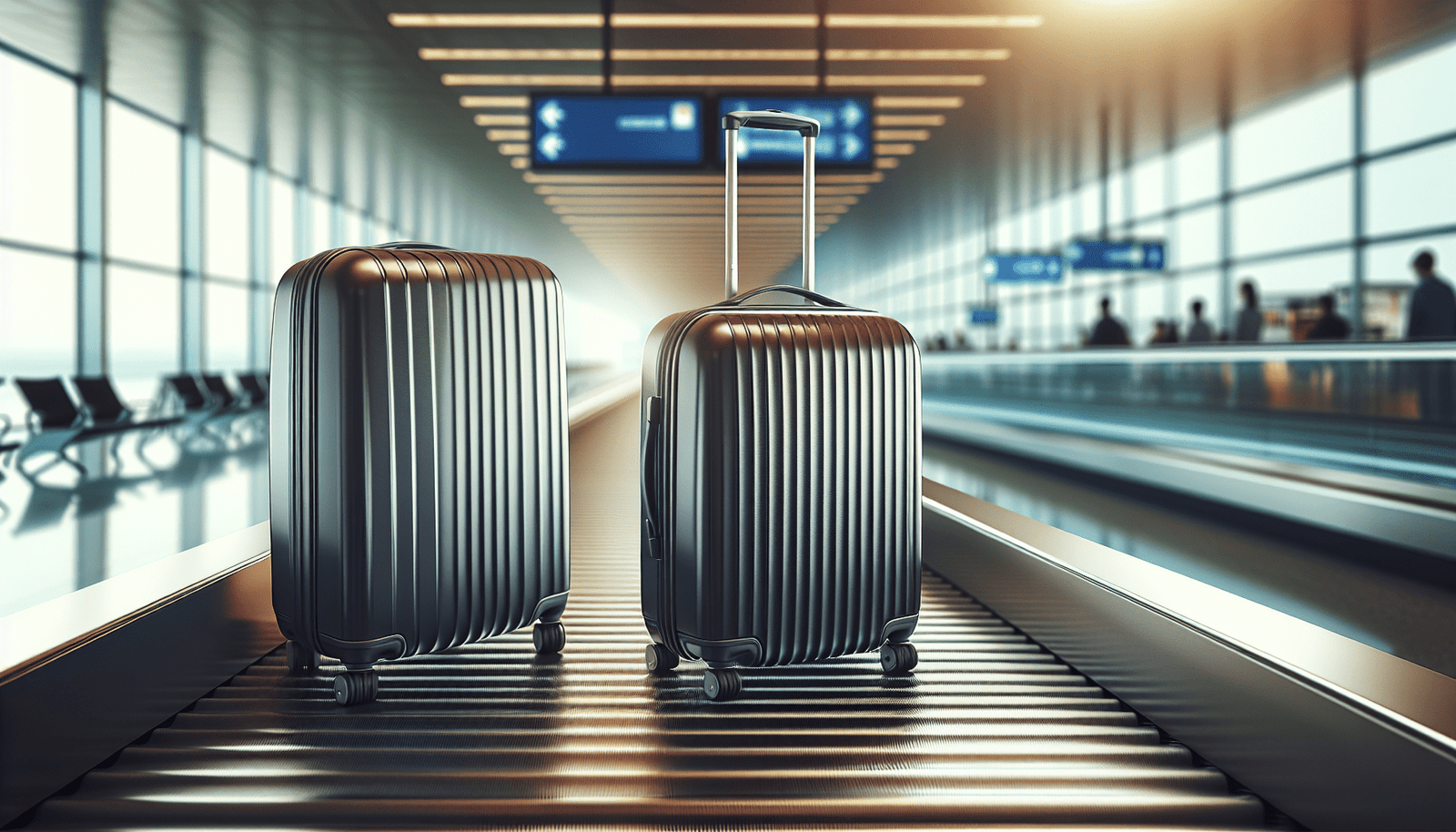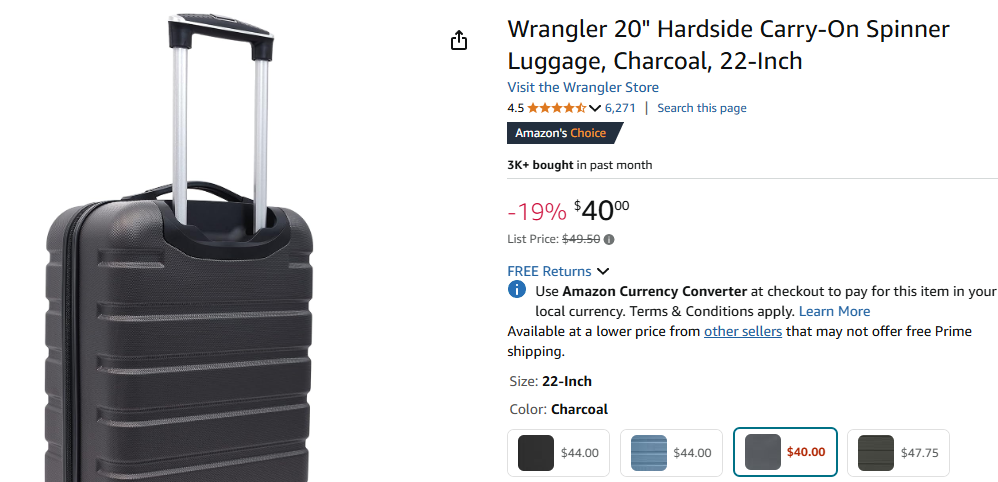In 2024, airlines are stepping up their game with tighter carry-on rules, potentially adding new challenges to your travel plans. These changes aim to enhance efficiency and space management but could end up costing you more if you’re not careful. Fortunately, there’s a handy video by Nik and Allie at Away Together that shares five essential tips to help you glide through these new requirements without any unexpected fees. This video is designed to ensure that your carry-on remains a convenient and cost-effective travel companion.
By arming yourself with the right knowledge, like the particulars of airline-specific rules and wise packing strategies, you can stay ahead of these changes. The content even highlights trusted carry-on options, such as the Travel Pro Maxlight 5 and Briggs & Riley ZDX International Carryon, proven to fit within most airlines’ strictest parameters. Be sure to utilize your personal item space wisely and consider using a backpack to sidestep extra scrutiny. Keep your travel both seamless and budget-friendly with these insights and travel with peace of mind, knowing you’ve got it all figured out.
Understanding New Carry-On Rules
Traveling has evolved considerably over the years, and as we step into 2024, airlines are rolling out stricter carry-on policies that could impact your travel plans. Understanding these new rules and how they apply to you is crucial in ensuring your air travel remains as smooth and free of unexpected fees as possible.
Airlines’ Motivation Behind Stricter Policies
Airlines are motivated to implement stricter carry-on rules primarily due to space constraints and efficiency needs. With the increase in passengers opting for carry-ons to avoid additional luggage fees, overhead bin space has become a precious commodity. Airlines are trying to streamline boarding procedures to avoid delays, and enforcing these rules helps ensure that boarding and deplaning are quick and efficient. Airlines, especially budget ones, also use carry-on fees as a revenue model—every penny counts in this competitive industry.
Impact on Travelers: More Than Just Nuisance
For travelers like you, these carry-on policies can feel like more than just a minor inconvenience. With limitations on the size and number of bags, you may find yourself struggling to pack efficiently or having to shell out extra cash for baggage fees. These policies can lead to stress during packing and an unpleasant surprise at the gate if your bag doesn’t meet the requirements. Moreover, using a carry-on helps in avoiding the wait at baggage claims and ensures your luggage arrives with you at your destination, which makes understanding these rules even more important.
Importance of Knowing Specific Airline Regulations
Each airline has its own set of rules regarding carry-on luggage size, weight, and even the number of allowed personal items. Being aware of these specifics can save you both time and money. Especially for international travel, where restrictions tend to be tighter, knowing your airline’s regulations is crucial. It is advisable to research the rules of all airlines pertinent to your itinerary to avoid last-minute surprises.
The Strategy Behind Avoiding Bag Fees
Familiarity with carry-on rules doesn’t just lead to a smoother travel experience; it’s also the key to avoiding unnecessary fees. Here are some strategies tailored to help you sidestep those pesky costs.
Knowing Your Ticket Benefits: Hidden Perks
Many travelers overlook the fine print of their airline tickets, missing out on valuable benefits. Some tickets might include free checked baggage or additional carry-on allowances. Occasionally, loyalty programs or frequent flyer points offer additional perks that can help bypass fees. Understanding these hidden benefits can be the difference between a hassle-free trip and one peppered with unexpected charges.
Travel Credit Cards: The Fee Game-Changer
Travel credit cards often come with a plethora of perks, including statement credits for airline fees, which can cover the cost of carry-on or checked luggage. Choosing the right credit card can be a game-changer in managing and potentially eliminating excess baggage costs. Make sure to review the benefits of your cards and take advantage of offers such as free luggage allowance or priority boarding, which can also sometimes come with credit card perks.
Timing Your Ticket Booking for Maximum Advantage
Believe it or not, the timing of your ticket purchase can impact your baggage fees. Airlines occasionally offer promotions that include checked baggage for tickets purchased by a specific date. Booking your flights during such promotions, or selecting bundles at the time of booking that include larger baggage allowances, can help you avoid fees.

This image is property of i.ytimg.com.
Choosing the Right Carry-On Bag
Selecting a carry-on bag is more complex than just picking what looks good. The right bag can save you from unexpected fees and boarding hassles.
Best Options in the Market: Travel Pro Maxlight 5 vs. Briggs & Riley ZDX
When selecting a carry-on, durability and size compliance are key. The Travel Pro Maxlight 5 is renowned for its lightweight design and perfect fit within most airline sizers, making it a favored choice for domestic travel. Meanwhile, the Briggs & Riley ZDX is specifically designed for international travel, offering sturdiness alongside practical features. These bags not only conform to airline regulations but also add convenience to your travel.
Size and Weight Considerations for Different Airlines
Carry-on size and weight limitations can vary greatly between airlines. Domestic flights in the U.S. typically allow slightly larger bags compared to international flights. European and Asian carriers often have stricter size and weight restrictions, sometimes limiting carry-ons to between 7 to 10 kilograms (15 to 22 pounds). Knowing these limits and choosing a versatile bag can help minimize packing stress.
The Backpack Hack: Flying Under the Radar
Using a backpack as your carry-on can sometimes help you avoid stricter scrutiny than larger roller bags might attract. Backpacks can be easily adjusted and fit under seats more conveniently. This method allows for more flexibility and can be particularly useful if you’re traveling with airlines that usually enforce size regulations more stringently.
Mastering the Art of Efficient Packing
Packing efficiently is an art that requires practice and a bit of strategy to ensure compliance with carry-on rules without sacrificing the essentials.
Conducting a Test Pack: Trick for Pro Travelers
A week before your trip, try a test pack to see how much space your items take up and to identify unnecessary items. Living solely out of your suitcase for a few days can help you determine what you truly need to bring, thus avoiding overpacking—an important skill that helps in staying within weight limitations.
Balancing Essentials and Space: A Psychological Game
Packing is more than just a physical task; it’s a psychological game of balancing what you want to bring with what you really need. When packing, prioritize essentials and strategize what’s vital for the first few days of your trip. This approach not only saves space but also supports quick decision-making if your carry-on has to be gate-checked.
Weight Limitations: Staying Within the Framework
Weight limitations can be challenging, especially on international flights. Choose lightweight packing solutions, such as eliminating heavy items or choosing multi-purpose clothing that can serve different functions. Being mindful of your bag’s weight can prevent you from facing unexpected fees at the gate.

Optimizing Personal Item Usage
Your personal item is just as important as your carry-on when it comes to efficient travel.
Vital Must-Haves in Your Backpack or Laptop Bag
Ensure you pack critical items like electronics, chargers, travel documents, and toiletries in your personal item. These are irreplaceable and should be on hand throughout the flight. This bag should also include anything you might need during or immediately after your flight, accessing them easily without having to delve into your carry-on.
Planning for Gate Check Contingencies
Even the best-laid plans can be disrupted, necessitating a gate check of your carry-on. Be prepared by keeping essential and valuable items in your personal item, so they’re with you at all times. This prevents the loss or delay of important personal belongings should your carry-on need to be stored in the cargo hold.
Striking the Right Balance: Necessity vs. Convenience
Finding a balance between necessary items and what adds convenience can drastically improve your travel experience. Keep in mind that what is most convenient to bring isn’t always essential, and cutting these items can save space and weight, preventing additional stress and costs.
Navigating Boarding Procedures Smartly
Boarding procedures can become a source of stress, but with a few savvy strategies, they don’t have to be.
Boarding Early: Beat the Overhead Bin Challenge
Boarding early is crucial if you want to ensure your carry-on has space in the overhead bin. This can be achieved by checking in online as early as possible and ensuring you’re at the gate ahead of boarding time. Having a plan to board early can prevent the hassle of having to gate-check your carry-on due to limited bin space.
Understanding Boarding Groups and Priority Boarding
Each airline has different boarding process priorities and groups. Knowing which boarding group you belong to, and leveraging any priority boarding options available to you—often a benefit of certain credit cards or frequent flyer programs—can enhance your boarding experience and guarantee space for your carry-on.
Staying Alert and Adapting Real-Time
Flight conditions and boarding procedures can change rapidly. It’s important to stay alert for any announcements and be ready to adapt. Being proactive in such situations can help you avoid mishaps like misplaced bags or unplanned gate checks.

Leveraging Technology and Resources
Technology is at your disposal to ease the travel process, and using the right tools can keep you one step ahead.
Using Apps for Latest Airline Guidelines
Many airlines offer mobile apps that provide up-to-date information on baggage rules and restrictions. These apps often send notifications if there are changes or updates to your specific flight. Utilizing such technology means you’re always informed about the latest guidelines.
Exploring Luggage Review Platforms: An Advantageous Dive
Delving into luggage review platforms before purchasing can provide insights into which bags comply with most airlines’ rules. These platforms host user reviews and professional critiques, offering a detailed understanding of a bag’s functionality and durability, helping you make an informed decision.
Benefitting from Advertiser Disclosures and Affiliate Links
Though sometimes overlooked, disclosures and affiliate links can be a treasure trove of information. These often indicate trusted brands and products recommended by others who have tested them, so paying attention to these can be advantageous.
Staying Updated with Policy Changes
Airline policies are subject to change, and staying informed can aid in avoiding unexpected complications.
Why Expiration of Offers Isn’t a Deal Breaker
Offer expirations are part of the travel landscape, but they aren’t the end of the world. New offers often replace expired ones, and staying informed through official airline channels ensures you don’t miss out on potential savings and benefits.
Signing Up for Alerts and Airline Updates
Most airlines allow you to sign up for newsletters or alerts, providing updates on policy changes and exclusive offers. Being on these lists keeps you informed and ready to respond promptly to any shifts in policy or available deals.
The Role of Forums and Community Insights
Online forums and travel communities are excellent resources for learning about recent experiences and changes in airline policies. Engaging with these communities can provide personal insights and tips from fellow travelers who have encountered similar challenges.
Dealing with Budget Airlines
While budget airlines offer economical options, they can come with their own set of baggage challenges.
Understanding Revenue Models: Carry-On Charges
Budget airlines often generate revenue through fees for baggage and other extras. Understanding this model can help you anticipate costs and avoid getting caught by surprise when charges appear for your carry-on at check-in or boarding.
Controversial Enforcement: Handling Surprises at Boarding
Budget airlines have been known for strict enforcement, and occasionally overzealous gate agents might challenge your luggage’s compliance. Knowing your rights and having a clear understanding of what you’re allowed to bring can help you navigate these situations without additional stress.
Evaluating the Cost-Benefit Equation: Is It Worth It?
Consider the overall cost and convenience when opting for budget airlines. While cheaper tickets can be enticing, the additional fees for carry-ons and other services may tip the balance. Evaluate whether these fees offset the initial savings to make a well-rounded decision that aligns with your travel needs.
Conclusion: Ensuring Hassle-Free Carry-On Travel
Navigating the world of airline carry-on rules doesn’t have to be daunting if you’re armed with the right strategies and mindset.
Summarizing Strategies for Savvy Traveling
From understanding specific airline regulations to utilizing the best travel credit cards and timing your ticket purchases strategically, a range of tools is at your disposal to enhance your travel experience and avoid unnecessary fees.
Adopting a Traveler’s Mindset: Flexibility and Preparedness
Being flexible and prepared is key to traveling smart. The world of airline travel is dynamic and ever-changing. Adopting a mindset of adaptability and readiness can transform potential obstacles into mere stepping stones on your journey.
The Sustainable Approach to Avoiding Fees Long-Term
Long-term preparation involves investing in suitable luggage, keeping yourself informed of policy changes, and consistently utilizing travel hacks and technology. This sustainable approach ensures that you’re always ready for upcoming trips without being deterred by unexpected fees.
Armed with these insights, you’re well-prepared to face the evolving travel landscape of 2024 and beyond. Happy travels!
Some of the links on this site are affiliate links, which means I may earn a small commission if you click on them and make a purchase, at no additional cost to you. As an Amazon Associate, I earn from qualifying purchases.

